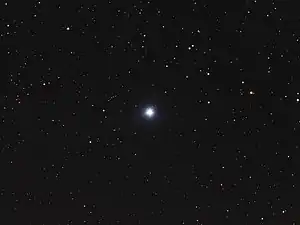 50 Cassiopeiae in optical light | |
| Observation data Epoch J2000 Equinox J2000 | |
|---|---|
| Constellation | Cassiopeia |
| Right ascension | 02h 03m 26.10206s[1] |
| Declination | +72° 25′ 16.6376″[1] |
| Apparent magnitude (V) | +3.95[2] |
| Characteristics | |
| Evolutionary stage | main sequence[3] |
| Spectral type | A2 V[3] |
| B−V color index | −0.002±0.007[2] |
| Astrometry | |
| Radial velocity (Rv) | −18.2±0.9[4] km/s |
| Proper motion (μ) | RA: −43.57[5] mas/yr Dec.: +22.30[5] mas/yr |
| Parallax (π) | 20.76 ± 0.14 mas[5] |
| Distance | 157 ± 1 ly (48.2 ± 0.3 pc) |
| Absolute magnitude (MV) | 0.54[2] |
| Details | |
| Mass | 2.56±0.03[3] M☉ |
| Radius | 2.5[6] R☉ |
| Luminosity | 63.8+3.5 −6.4[3] L☉ |
| Temperature | 9,376+240 −235[3] K |
| Metallicity [Fe/H] | +0.18±0.28[7] dex |
| Rotational velocity (v sin i) | 91[3] km/s |
| Other designations | |
| Database references | |
| SIMBAD | data |
50 Cassiopeiae is a white star in the northern constellation of Cassiopeia. In the past, it had been misidentified as a suspected nebula, and given the number NGC 771.[9] The star is visible to the naked eye, having an apparent visual magnitude of +3.95.[2] Based upon an annual parallax shift of 20.76 mas, it is located 157 light years away. It is moving closer, having a heliocentric radial velocity of −18 km/s,[4] and will approach to within 82 ly in 1.879 million years.[2]

It is an A-type main-sequence star with a stellar classification of A2 V.[3] It is a suspected variable star with a very small amplitude.[11] 50 Cas has an estimated 2.56 times the mass of the Sun,[3] and about 2.5 times the Sun's radius.[6] It is radiating 64 times the Sun's luminosity from its photosphere at an effective temperature of around 9,376 K.[3]
The star was the brightest star in the occasionally used 1775 to 19th century constellation Custos Messium, typically drawn as a depiction of Charles Messier standing on top of the giraffe (Camelopardus), between Cepheus and Cassiopeia.[12]
References
- 1 2 Brown, A. G. A.; et al. (Gaia collaboration) (August 2018). "Gaia Data Release 2: Summary of the contents and survey properties". Astronomy & Astrophysics. 616. A1. arXiv:1804.09365. Bibcode:2018A&A...616A...1G. doi:10.1051/0004-6361/201833051.
- 1 2 3 4 5 Anderson, E.; Francis, C (2012), "XHIP: An extended hipparcos compilation", Astronomy Letters, 38 (5): 331, arXiv:1108.4971, Bibcode:2012AstL...38..331A, doi:10.1134/S1063773712050015, S2CID 119257644.
- 1 2 3 4 5 6 7 8 9 Zorec, J.; Royer, F. (2012), "Rotational velocities of A-type stars. IV. Evolution of rotational velocities", Astronomy & Astrophysics, 537: A120, arXiv:1201.2052, Bibcode:2012A&A...537A.120Z, doi:10.1051/0004-6361/201117691, S2CID 55586789.
- 1 2 de Bruijne, J. H. J.; Eilers, A.-C. (October 2012), "Radial velocities for the HIPPARCOS-Gaia Hundred-Thousand-Proper-Motion project", Astronomy & Astrophysics, 546: 14, arXiv:1208.3048, Bibcode:2012A&A...546A..61D, doi:10.1051/0004-6361/201219219, S2CID 59451347, A61.
- 1 2 3 Van Leeuwen, F. (2007). "Validation of the new Hipparcos reduction". Astronomy and Astrophysics. 474 (2): 653–664. arXiv:0708.1752. Bibcode:2007A&A...474..653V. doi:10.1051/0004-6361:20078357. S2CID 18759600.
- 1 2 Pasinetti Fracassini, L. E.; et al. (February 2001), "Catalogue of Apparent Diameters and Absolute Radii of Stars (CADARS) - Third edition - Comments and statistics", Astronomy and Astrophysics, 367 (2): 521–524, arXiv:astro-ph/0012289, Bibcode:2001A&A...367..521P, doi:10.1051/0004-6361:20000451, S2CID 425754.
- ↑ Gáspár, András; et al. (August 2016), "The Correlation between Metallicity and Debris Disk Mass", The Astrophysical Journal, 826 (2): 14, arXiv:1604.07403, Bibcode:2016ApJ...826..171G, doi:10.3847/0004-637X/826/2/171, S2CID 119241004, 171.
- ↑ "50 Cas". SIMBAD. Centre de données astronomiques de Strasbourg. Retrieved 2018-06-25.
- ↑ Wolfgang Steinicke (19 August 2010). Observing and Cataloguing Nebulae and Star Clusters: From Herschel to Dreyer's New General Catalogue. Cambridge University Press. ISBN 978-1-139-49010-8.
- ↑ MAST: Barbara A. Mikulski Archive for Space Telescopes, Space Telescope Science Institute, retrieved 8 December 2021.
- ↑ Koen, Chris; Eyer, Laurent (2002). "New periodic variables from the Hipparcos epoch photometry". Monthly Notices of the Royal Astronomical Society. 331 (1): 45–59. arXiv:astro-ph/0112194. Bibcode:2002MNRAS.331...45K. doi:10.1046/j.1365-8711.2002.05150.x. S2CID 10505995.
- ↑ Ian Ridpath's Star Tales - Custos Messium
External links
- "DOCdb page for 50 Cas". Retrieved 2016-12-09.